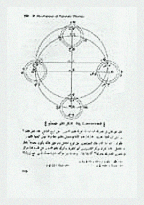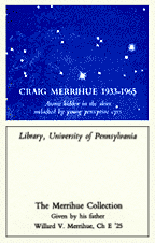Craig M. Merrihue Memorial Fund

In memory of a vibrant astrophysicist
In Craig Merrihue's memory, his father, Willard V. Merrihue, established this fund in 1965. Willard Merrihue, a graduate of Penn's School of Engineering in 1925, directed that income be used for books for Penn's multidisciplinary Benjamin Franklin Honors Seminar program and for books on astronomy and astrophysics.
Craig Morris Merrihue, 1933-1965
Excerpted from Meteoritics, Vol. 4, No. 1, February, 1968.
By Robert Pepin and John Reynolds
Dr. Craig M. Merrihue, physicist of the Smithsonian Astrophysics Observatory and research associate at the Harvard College Observatory, Cambridge, Massachusetts, died in a mountain-climbing accident on Mount Washington on March 14, 1965. In this tragedy, the wide community of his friends lost a remarkable personality, and geophysics lost a young scholar who in a very short time had demonstrated exceptional talents in research. Craig Merrihue was a scientist of unusual accomplishment and bright promise because he was, for those who knew him, a remarkable man, a complete individual. He lived the many elements of his life with enthusiasm, with dedication, and with a warm and original humor. He had a zest for living: for his family, for people, for food, for his mountains, his causes, and his work. The joy he found in science was typical. Losing him was bitter, but his brief time on the scene was unforgettable.

Born in Schenectady, New York, on July 8, 1933, Craig Merrihue entered Harvard College in 1952. He was interested in physics, but by no means exclusively. Over the next four years, he provided classmates with a thorough--and active--subsidiary education in subjects ranging from folk music, cars, and skiing, to mountaineering--then and always his first love and a great skill. Within the next ten years he was to climb extensively in the United States, Canada and Mexico, lead a group to the Peruvian Andes, and join in a major expedition to Pakistan...With his wife Sandra and their son Jeffrey, born in 1959, he lived in Berkeley for five years. His deep personal commitments and an extraordinary breadth of interests led him to identify strongly with the civil, political and social currents which were rising on the Berkeley campus.
But it was his scientific work which began to claim him to an increasing extent. He joined the mass spectrometry laboratory in the Department of Physics in 1960. By 1962 he was deeply involved in his first investigation of rare gases in the Bruderheim meteorite--work for which he later received the first Nininger Meteorite award...The years 1963 and 1964 mark the phenomenal period in his short career as a scientist. Before that time he was still an apprentice, working either under supervision or in collaboration with more senior colleagues who directed the work. In 1963 he began to work alone and with prodigious energy. In the short span of two years he completed four projects in meteoritic and cosmochemistry which have had great influence in these fields.

